Reaching the 100 employee mark is a significant milestone for any organization. This achievement not only opens up opportunities for growth but also brings with it a number of challenges, including expense management – a key factor in controlling costs and optimizing corporate finances. As the workforce grows, the business travel process becomes more complex. This requires companies to change the way they manage expenses, not only to ensure policy compliance but also to increase spending efficiency.
In this article, we will learn about what business expenses are, why business expense management is important, the difficulties in managing business expenses in expanding businesses, and ways to effectively manage business expenses.
1. What is a business trip expense? Why is it necessary to manage business trip expenses?
Business trip expenses is the expense that a business or organization pays for employees when they travel on business, work away from the company headquarters or participate in professional activities. Business expenses include costs related to travel, meals, accommodation and other expenses necessary to complete the work tasks.

Per diem expenses typically include:
- Transportation costs: Includes airfare, train, car, and other transportation costs such as taxi fees, car rental, or public transportation tickets.
- Accommodation: Costs for staying at hotels, motels or other accommodations, depending on the time and location of the business trip.
- Meal and living expenses: Usually include daily meals and other small expenses related to personal needs during work.
- Other incidental expenses: Other work-related expenses such as parking fees, Internet access fees, business travel expenses and other incidental expenses as determined by the company.
Systematic expense management helps reduce unreasonable expenses while increasing transparency, making it easier for businesses to monitor and control their budgets.
2. Why do businesses need to develop a business expense management policy?
As businesses expand and staff numbers increase, the need for business travel increases significantly. This presents many challenges in managing business travel expenses effectively. Some of the challenges include:
- Complexity in the process: As more departments and employees are involved in business travel, expense management becomes more complex. Manual processes such as expense approval, reporting, and payment can be time-consuming and error-prone.
- No unified management tool yet: Many companies still use spreadsheets or non-specific tools to manage travel expenses, which makes expense tracking difficult and inconsistent.
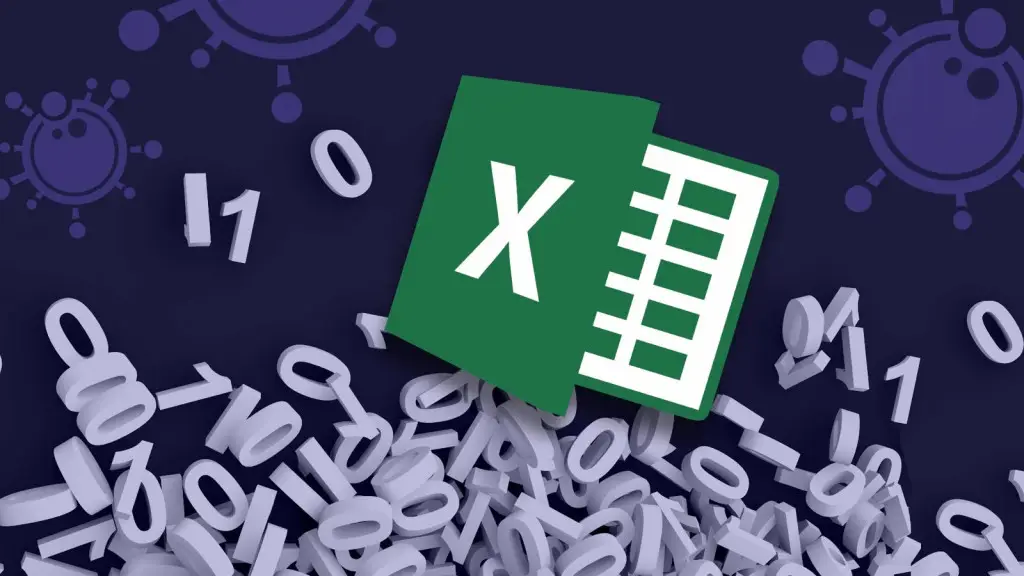
- Manage unexpected costs: In some cases, employees may encounter unforeseen situations when traveling for work, such as unplanned expenses (meals, taxis, or ticket cancellation fees), which makes it difficult for finance departments to control costs.
- Lack of clarity in travel expense policy: If a company does not have a clear and transparent expense policy, employees may not have a clear understanding of what expenses are eligible, leading to off-budget spending.
With the above difficulties, managing travel expenses will help businesses save costs effectively. At the same time, a comprehensive travel expense policy also plays an important role in maintaining transparency and efficiency in financial activities. Here are some reasons why managing travel expenses is necessary:
- Financial cost control: Business travel expenses are one of the major expenses of a business, especially for companies with large staff and high frequency of business trips. Managing business travel expenses helps to minimize unnecessary costs and ensure that the budget is used effectively.
- Comply with company policies: Every company has a travel expense policy to ensure that employees stay within their budget. Keeping a tight control over travel expenses helps ensure compliance with financial policies and avoid overspending.
- Increased transparency: Effective expense management helps create transparency in the expense approval process, while also making it easier for finance departments to check and reconcile expenses incurred.
- Risk management: Expense management helps detect unreasonable or fraudulent expenses early, thereby minimizing risks for the business.
3. Basic requirements when building work policies
To effectively control costs, the travel expense policy needs to be built on a clear, detailed and easy-to-understand foundation. The basic requirements when building a travel expense policy include:
- Determine the scope and subjects of application: The employment policy must specify who it applies to. In this case, the policy will apply to all company employees, including both senior and junior employees, depending on the regulations of each company.
- Purpose of trip: The policy should clearly define the purpose of the business trip. This is an important factor in classifying business trips into groups: business travel, conferences, training, or strategic business trips. Each type of business trip will have different expense regulations.

- Details of business expenses: The policy should specify what types of expenses will be reimbursed by the company, including airfare, hotel, transportation, meals, and other business expenses such as phone and internet charges.
- Approval process: To ensure cost control, the policy should provide a clear travel approval process. This process may include completing a travel request form, requesting approval from management, and obtaining confirmation from the finance department.
- Cost Limit: The policy should set a limit for each type of expense (such as the cost of a meal, a night at a hotel, etc.). This will help the company control the budget and avoid unnecessary expenses.
4. Business expense management process
The expense management process involves several steps, from employee planning to completion of the expense report. The basic steps in the process include:
- Business trip planning and approval: Before going on a business trip, employees need to submit a business trip request with basic information such as the purpose of the trip, time, location, and estimated cost. This process requires approval from management to ensure the plan is consistent with the budget and work goals.
- Conducting business trips and recording expenses: During business trips, employees collect invoices and documents related to expenses to report upon completion of the trip.
- Submitting a Travel Expense Report: After completing a trip, employees submit a travel report along with supporting documents for the finance department to review. This report typically includes the purpose, expenses, duration of the trip, and other pertinent information.
- Approval of reports and reimbursement of expenses: The accounting or finance department will review the reports, check the validity of each expense, and approve the valid expenses. The company will then reimburse these expenses to the employee or adjust the salary in the next pay period.
- Overall monitoring and analysis: Business expense data will be aggregated and analyzed, helping businesses track spending trends, thereby building more effective business expense management policies in the future.

4. Take advantage of a comprehensive expense management platform
One of the best solutions for effective expense management is to use a comprehensive expense management platform. These platforms help integrate all expense management processes into a single system, including booking, expense approval, reporting, and payment.
Benefits of using a comprehensive expense management platform:
Business expense management software is an extremely useful tool to help businesses control costs effectively, especially when the scale and demand for business expenses are increasing. Below are some features and characteristics of the types of businesses that need to use this software:
- Integrate all processes in one system: Employees can book flights, hotels, rental cars and report expenses through a single platform, saving time and reducing errors.
- Auto Approval: These platforms allow for automated approval workflows based on company policies, making approvals faster and more efficient.
- Real-time cost tracking: Expense management platforms provide immediate expense insights, allowing finance teams to track budgets and make timely adjustments.
- Increased transparency: Using the platform enables the entire company to access expense information, thereby increasing transparency and control.
As businesses expand and the number of business trips increases, managing business expenses becomes a major challenge. Bizzi Expense was born as a solution to help businesses optimize the process of managing business expenses, save costs and improve work efficiency.
Bizzi Expense is a comprehensive expense management platform that uses AI technology and process automation to help businesses control spending transparently and efficiently.
Outstanding features of Bizzi Expense:
- Easy cost management: Bizzi Expense helps businesses manage all business-related expenses such as airfare, hotels, food, travel, and other expenses. Users just need to enter the details of the expenses and the system will automatically classify, calculate, and report the expenses.
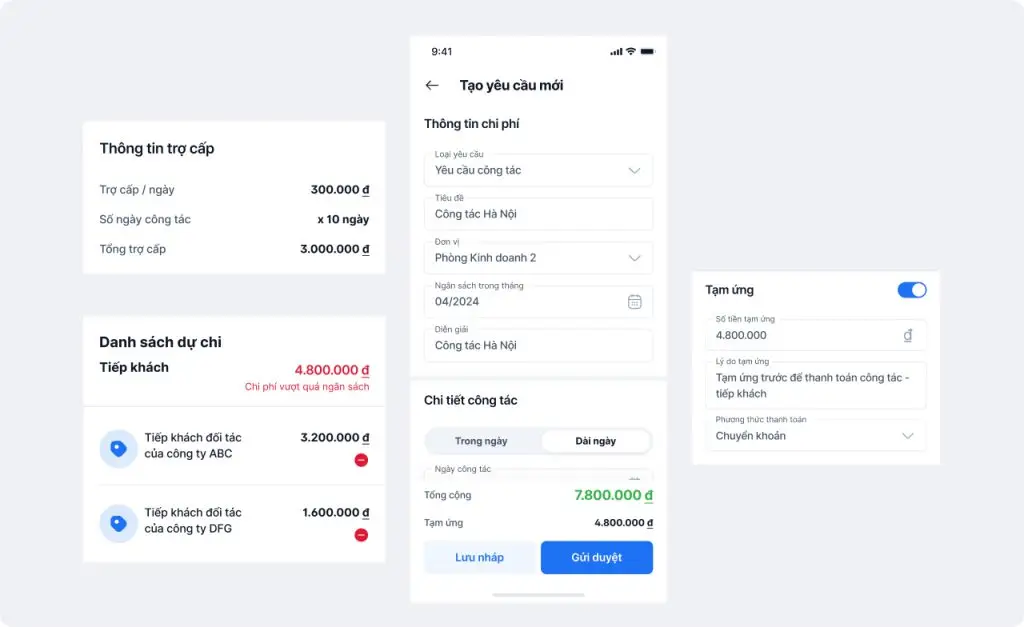
- Auto Approval: Bizzi Expense integrates an automated expense approval process, making it easy for management to approve expenses according to company policies without manual work. Invalid expenses are automatically eliminated, minimizing errors and fraud.
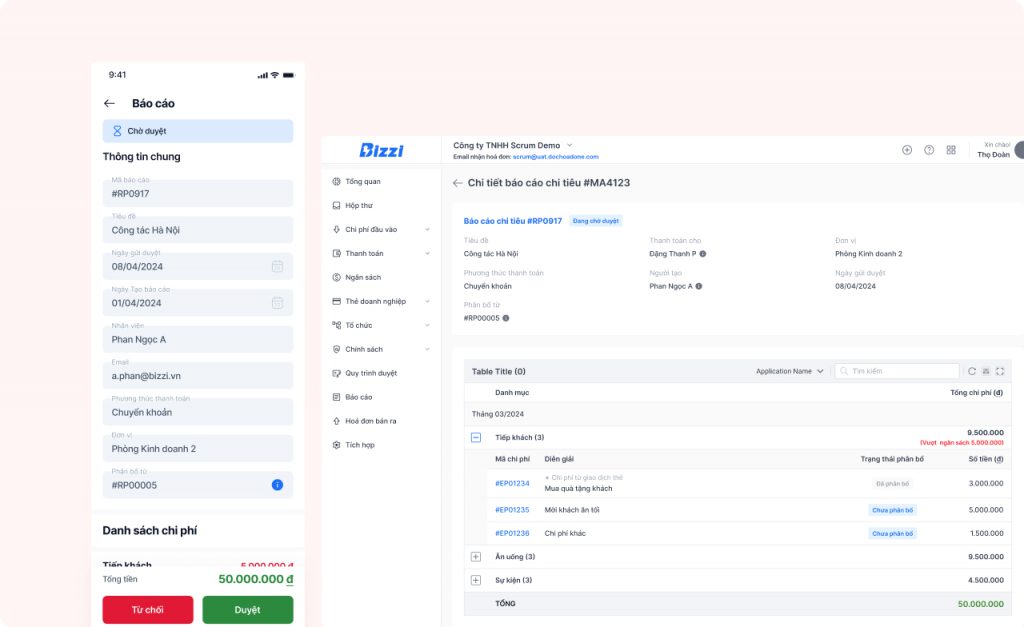
- Real-time cost tracking: With Bizzi Expense, managers can track expenses instantly, helping them control their work budget and make timely adjustments to avoid going over budget.
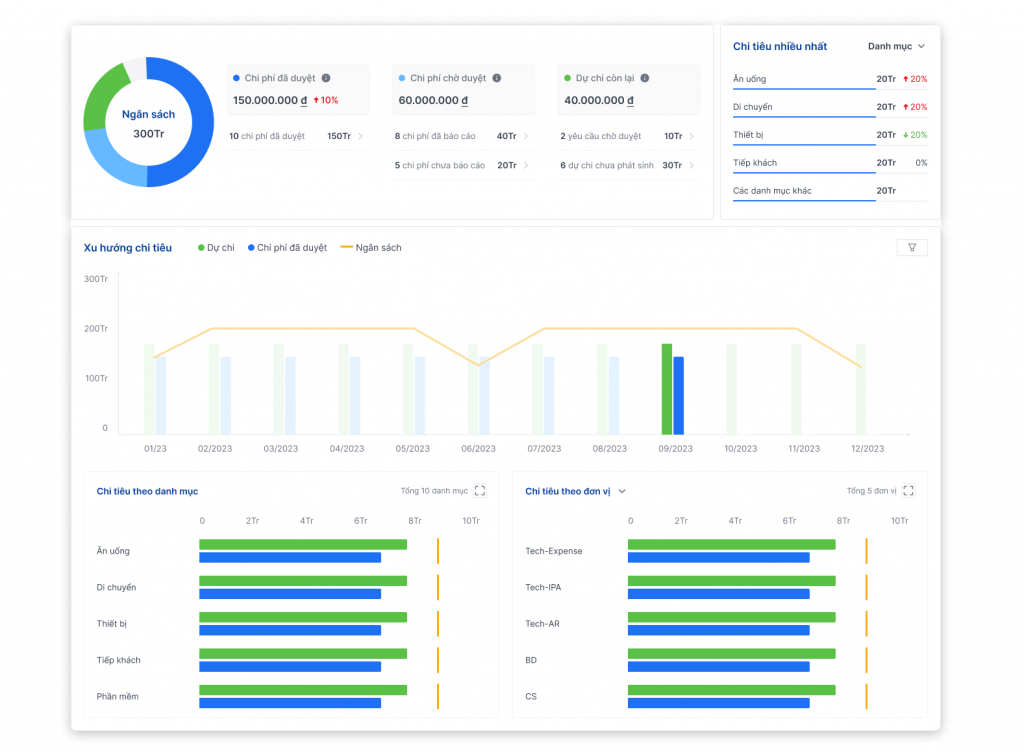
- Detailed cost report: The Bizzi Expense system provides detailed expense reports for each business trip, employee or department, helping businesses easily track and analyze spending.
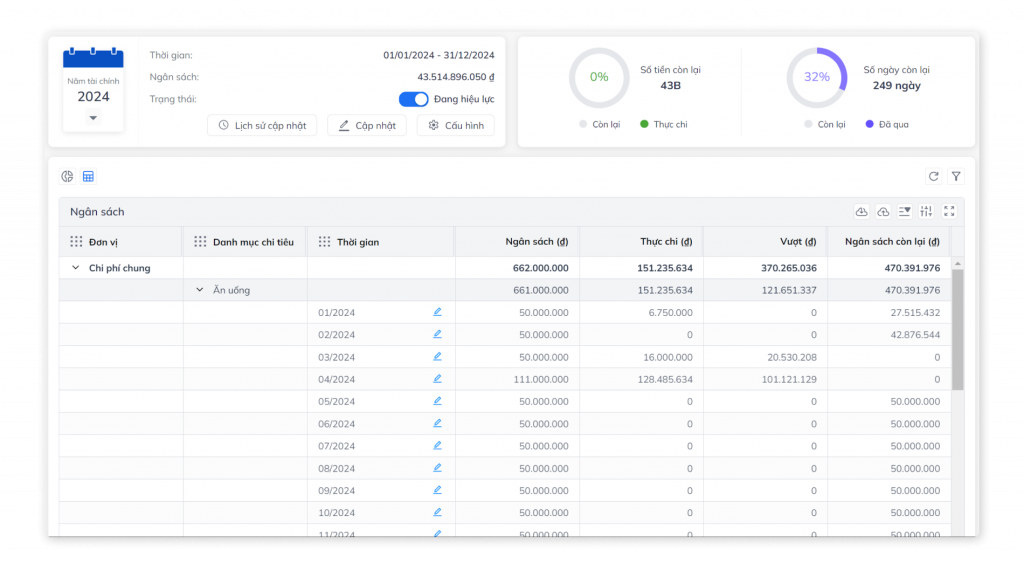
- Integration with corporate financial systems: Bizzi Expense easily integrates with your business's financial and accounting management systems, helping to synchronize data and reduce manual data entry efforts.
Sign up for a free trial now at: https://bizzi.vn/dang-ky-dung-thu/
5. Conclusion
Expense management is an important factor in helping businesses control expenses, maintain transparency and ensure smooth business trips. As businesses expand and staff numbers increase, optimizing expense management processes becomes an essential requirement. Applying expense management technology platforms not only helps to simplify processes but also ensures that expenses are tightly controlled, risks are minimized and company budgets are optimized.
With Bizzi Expense, businesses can easily manage their expenses in a transparent and efficient manner, from planning, approval to expense tracking, ensuring all processes are clear and in compliance with spending policies.


